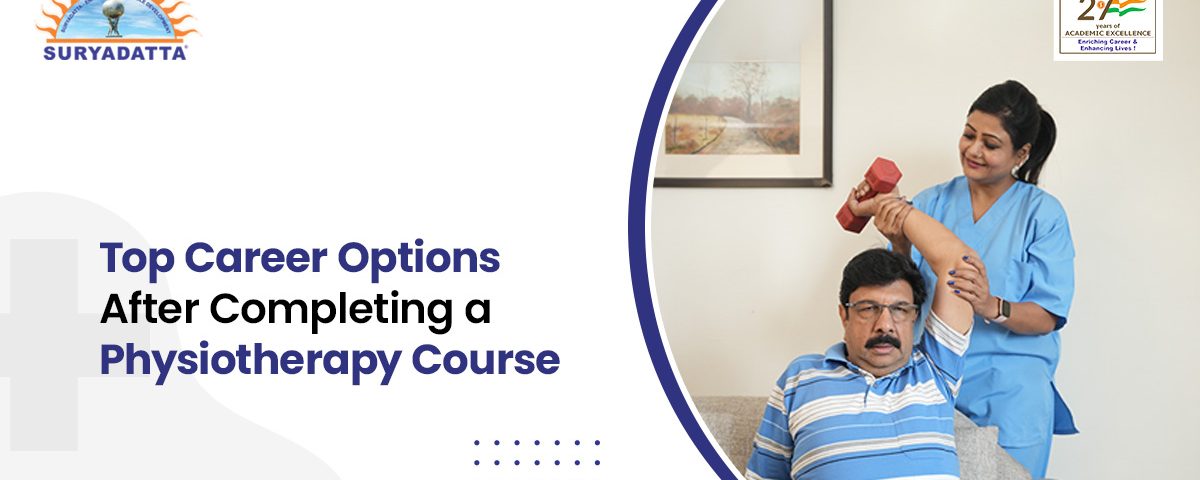Top Career Options After Completing a Physiotherapy Course

The Importance of Physiotherapy in Today’s Healthcare
September 5, 2025
What Is the Future Scope of Physiotherapy in India Today?
October 1, 2025Bachelor of Physiotherapy course is 4.5-year undergraduate program which teaches students about movement and rehabilitation. The Bachelor program encompasses 4 years of theory and 6 months of internship. Over the course of the program students study anatomy, physiology and biomechanics of the human body.
Also, we see to it that they leave with the in-depth knowledge of how to restore movement and function post illness or injury. The students are taught various skills from exercise therapy, manual therapy, etc which help them evaluate, restore and regain mobility in individuals.
Physiotherapy Course Curriculum, Clinical Internship & Skills
The physiotherapy curriculum is thought out to present a mix of theory, practical sessions, and clinical experience. We cover subjects like anatomy, physiology, pathology, biomechanics, exercise and electrotherapy, orthopaedics, neurology, and rehabilitation sciences. Each subject is a base for the study of how the body works and what we as physio’s done to get movement back in patients which are injured or have a health condition.
Clinical internships are of great importance in the BPT program. We place students in hospitals, clinics, and rehab centres where they interact with patients. In these settings they apply theory to practice. What they gain includes manual therapy, therapeutic exercise, pain management, and rehab planning. Also, students develop basic soft skills like patient care, communication, and empathy. By program’s end graduates are prepared to step into roles in hospitals, sports teams, and private practice.
Why Choose a Physiotherapy Course? Benefits, Career Scope & Demand
Physiotherapists are at the forefront of health care today. We see an increase in what is brought about by lifestyle which includes back pain, arthritis, and obesity which in turn sees the demand for skilled physiotherapists grow. In hospitals and clinics, we find that they are very much a part of the rehab team which reports to post surgical, accident or long-term illness related issues.
Also, corporate wellness programs, fitness centres, and community health initiatives are presenting new opportunities for physiotherapy professionals. We see that a Physiotherapy Course is a very relevant and in high demand choice which is true across many sectors.
Career Growth After BPT
A BPT graduate what we also call a fresher physiotherapist at the start of their career is usually found in hospitals, rehabilitation centres and physiotherapy clinics. They will do assessment of patient conditions, put together treatment plans and apply therapies which may include exercise, heat, ultrasound or electrical stimulation. Also, it is in the role of guiding patients through their rehab exercises and to see how they are progressing.
Fresh out of school physiotherapy play a support role to the senior physiotherapy teams. This early stage of career is very much a learning phase which in turn is very key to building up confidence and getting that first hand clinical experience. While entry level roles may be very much hands on patient care, what we see is that these roles also serve as the base for future development.
As time goes by physiotherapy may choose to specialize in sports, orthopaedic or neurology issues also they may go on to do higher study like an MPT. A very good start in the clinical setting really helps freshers to develop their skills, gain that credibility and in the long term to better their career.
Core Skills Needed to Become a Successful Physiotherapist
Physician evaluation is a key ability for physiotherapists. This includes study of a patient’s physical state, identification of what is amiss, and determination of the cause of their problems. Also, we see that in terms of treatment which manual therapy skills are very much of the same importance. We have techniques like joint mobilization, stretching, and soft tissue work which help patients to get back mobility and which in turn also put down pain.
Electrotherapy is a field in which physiotherapists use tools such as ultrasound, TENS, and short-wave diathermy for the purpose of healing and pain relief. We see also that which skills do is to help in rehabilitation and in the prevention of future injuries.
Patient Education, Communication & Empathy in Physiotherapy Practice
In addition to technical skills physical therapists also must develop strong communication and interpersonal skills. We inform patients of their condition, the recovery process, and preventive strategies. That which a patient may experience as anxiety or fear post injury or post-surgery is common and our ability as to communicate clearly builds out that trust and confidence.
Empathy plays a large role in physiatry. The physical is but one part of the picture, also there is the matter of patient support. We have that physiatrists do more than what can be seen in terms of physical recovery; also, we do what we can to assist them emotionally. It’s up to the physiatrist to hear out their patient’s issues and push them and motivate them for adherence in their care plan. In creating a professional relationship there is a better chance of quality of outcomes and of long-term relationships between the professional and the patient.
Top Career Options After Completing a Physiotherapy Course
Orthopaedic physiotherapists work with patients that have broken bones, had arthritis, or had joint replacement surgery. They improve range of motion, reduce pain, and strengthen muscles. We see in practice that they use things like exercise, manual therapy, and electrotherapy to get our patients back to normal function.
Neurological Physiotherapy Roles
Neuro physiotherapists work with patients that have had a stroke, a spinal cord injury, or have Parkinson’s disease. They help patients to improve balance, coordination and independence. Each patient’s care plan is tailored to their specific condition.
Cardiopulmonary & ICU Physiotherapy Roles
In the ICU and critical care units’ physiotherapists perform breathing exercises, chest clearance, and mobility recovery for patients post severe illness. They play a key role in getting patients back to full stamina and improved lung function after surgery or respiratory diseases.
Sports Physiotherapist & Athletic Rehabilitation Careers
Sports physiotherapists work with athletes to prevent injuries; at the field we see them dealing with emergency situations and in rehab of which they are in the thick of during practice or competition. Also, they are part of the travel team staff and very much into performance analysis.
Injury Prevention, Return-to-Sport & Performance Rehab
Another major role of sports physiotherapists is in the development of programs which put forward injury prevention strategies. Also, they work on 5 which athletes get back into competition action safely and performance improvement after injury.
Private Practice: Starting a Physiotherapy Clinic
Private it is that many physiotherapy graduates choose to go into private practice. Many pros set out on their own and provide independent services. This allows them to build up large patient bases, to specialize in what they do best, and to enjoy great career flexibility. To get a practice off the ground professionals must invest in equipment, space and marketing but in terms of career satisfaction and growth the rewards are great.
Government Jobs & Public Health in Physiotherapy
Physiotherapists in the public health field may also do so in government hospitals, defence services, or community health centres. In these roles they may see high job security and a very structured path of career development and that their work is a part of large-scale health care programs. Also, public health physiotherapy includes that professionals play a role in health awareness campaigns, preventive care, and rehab for disadvantaged population.
Physiotherapist Salary & Growth Factors
The salary for a physiotherapist is determined by many variables. Location, type of health care setting, years of experience, and specialization are key players. In urban hospitals or sports organizations professionals report to earn higher salaries as opposed to that in small clinics. Also obtaining extra certifications in manual therapy, dry needling, or advanced rehabilitation also which in turn improve earning potential.
Experience is also a great element. As physiotherapists accumulate years of practice and patient trust which in turn grows their reputation, they end up charging more for consultations. Also, those that go in for higher studies like MPT or PhD may go into teaching, research or senior clinical practice which pays better. In total physiotherapy presents a stable income growth and financial stability when you add to that continuous learning.
How to Choose the Right Physiotherapy Course / BPT College
When it comes to choosing a physiotherapy course students should first out that the school is a member of the relevant health councils. Accreditation which is a must, means the program meets academic and clinical marks. Also of great value are the teaching hospital partnerships which provide practical exposure during internships.
Labs, Rehabilitation Equipment & Sports Medicine Facilities
A solid physiotherapy program includes state of the art labs which are well equipped with the latest in rehab and exercise tech. We also have access to sports medicine facilities which in turn allow students to work in fields like athletic rehab and injury care. Also, we see that which to tech exposure during training which in turn improve learning results.
Internship Support, Rotations, Placement & Career Services
Internship which is a key element in the development of clinical skills. Which colleges that provide a wide range of rotations in hospitals, clinics, and rehab centres do — we are looking at a diverse set of settings for practice. Also, we see that which schools which also have very good placement support and career services play a great role in getting our graduates into the job market soon after they finish their BPT program.
Research Culture, Alumni Network & Industry Linkages
Research in physiotherapy which in turn allows students to look at new practices and play a role in the profession’s growth. Also, we have a great alumni network which is a source of mentoring, career advice and job connections. Also, we see that industry connections which in turn bring to light health care organizations and sports teams. Picking the right school which in turn gives you that base for a successful career.
Right Institute for Career in Physiotherapy:
If you are planning to begin your Bachelor of Physiotherapy course, it is important to choose the right institution which has academic excellence and practical training. A well thought out program which includes internships, modern labs, and industry partnerships will put you in a good position to handle real world issues. To get into detail on what is being offered by programs and courses you can check out SGI SIHS’ website and look at the Programs Offered section. What you do now will set the stage for a very successful physiotherapy career.
Conclusion:
Completing a physiotherapy program which is what a BPT is, puts graduates in many health care settings out there in hospitals, clinics, sports, rehabilitation centres and private practice. BPT program is very much a mix of theory and practice we see that it does an excellent job at preparing students for the wide range of health care roles out there.
As the world sees a growing need for physiotherapists which is a trend, we are seeing today graduates may look to a very rewarding and very important future in this career field. Whether it be working with athletes, patients who are on the road to health again after an illness, or health communities in which we are just looking out for the health of all, physiotherapists do great work in people’s lives.


